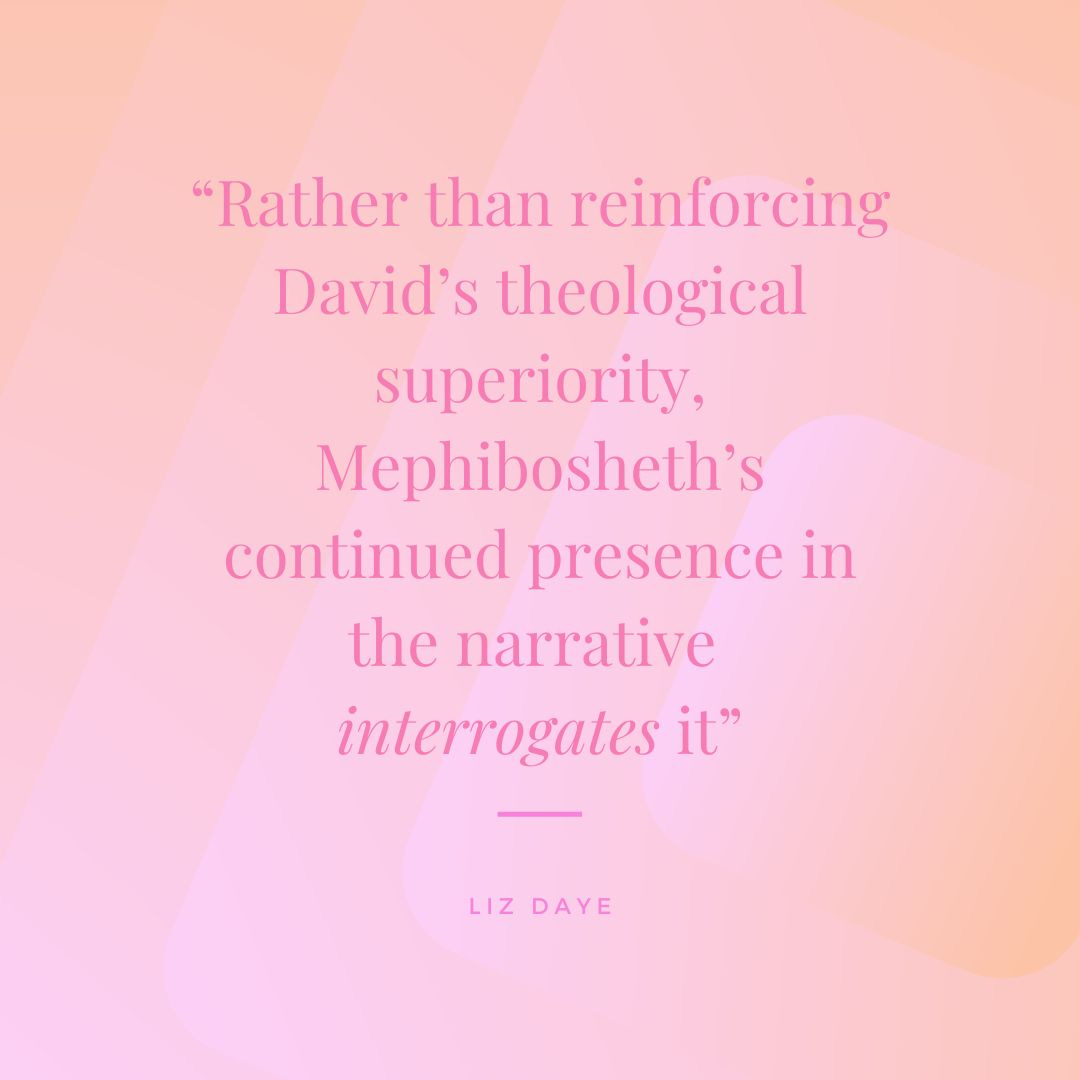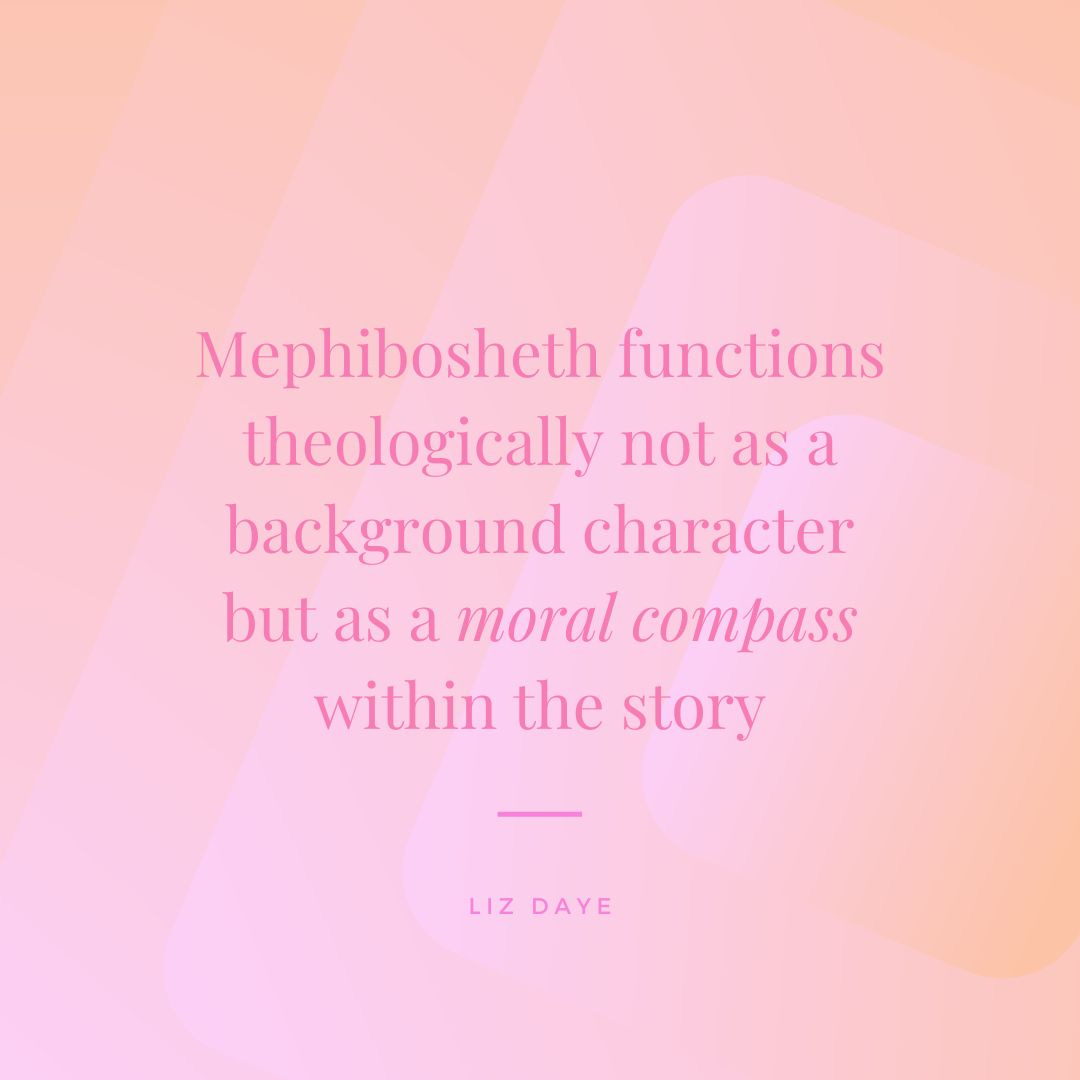Mephibosheth’s Theological Function Throughout 2 Samuel
And the integrity of the wounded
I know I know. I’ve been quiet here lately. I will put together a life update post soon and share some projects I’ve been working on, but as I’m catching my breath from seminary graduation, I’d love to shift my writing energy back toward some of my favorite topics.
If you’re new here, welcome! I’m Liz, a hospital chaplain and theologian writing at the intersection of disability, caregiving, and theology. I also write about weird things in the bible. And because I’m an extra serious student of culture, I write about theology as it relates to romantasy literature and Taylor Swift. If you’re a returning reader, you know I’ve been writing about Mephibosheth for years. :) Long story short, through my research, I’ve noticed a pattern that often minimizes his literary role, with various conclusions drawn based on attitudes or theological stances that aim to paint David in a favorable light. However, when we actually examine the text, many of these conclusions about David’s character start to unravel. So, what does that mean for the others in the drama-filled story of his reign? What does it mean for Mephibosheth when David’s responses in the text don’t actually match the benevolent reputation that evangelicals tout? What does it mean for readers today?
Among scholars of the Hebrew Bible, the so-called “Succession Narrative” (2 Samuel 9–20; 1 Kings 1–2) has generated diverse literary perspectives, particularly regarding its structure, sources, and theological intent. While some, such as Leonhard Rost, viewed the Succession Narrative as a unified, early composition designed to justify Solomon’s rise, others have emphasized the fragmentary, redacted nature of the material. The term “redacted narrative” is thus used to designate layers of later theological or political editing that reshape and reinterpret earlier episodes. Within this broader context, the “Benjaminite sections”—specifically 2 Samuel 9; 16:5–14; and 19:16–31—stand out for their thematic coherence around Saul’s surviving house, and are marked by unique linguistic and theological characteristics suggestive of an editorial stratum (often referred to as S3) with pro-Davidic and anti-Zeruiah leanings. These episodes prominently feature Mephibosheth (aka Meribaal), whose representation has elicited competing interpretations ranging from a passive figure of royal mercy to a contested character in the politics of covenantal loyalty.
One of the most detailed literary analyses of these Benjaminite sections comes from F. Langlamet, a seasoned biblical scholar and former contributor to the Revue Biblique, whose linguistic expertise and theological insight have made lasting contributions to the study of Samuel and Kings. In his 1981 article “David et la Maison de Saül,” Langlamet argues that these texts were deliberately shaped to uphold David’s divine mandate while discrediting his internal challengers, particularly the sons of Zeruiah. His approach isolates recurring vocabulary and syntax that connect these texts and reflect an editorial aim to contrast David’s piety and restraint with the militaristic excesses of Joab and his kin.1
Within this Benjaminite section of the redacted narrative, the literary-theological contrasts between David, Joab, and Mephibosheth serve as more than narrative devices. According to Langlamet’s analysis, these episodes were edited with deliberate linguistic and thematic precision to elevate David’s kingship, legitimize his theological standing, and distance him from the violent realpolitik embodied by the sons of Zeruiah, especially Joab. Langlamet contends that the redactor (S3) sought to reinforce David's divine mandate by juxtaposing his measured leadership against the unruly militarism of Joab, and to frame Mephibosheth as a loyal, pitiable foil whose presence reaffirms David’s magnanimity and divine favor. Within this framework, the Benjaminite texts become rhetorical tools in a larger editorial campaign to uphold David's legitimacy and suppress competing claims to power.
I challenge that redactional theology by arguing that Mephibosheth does not function merely as a passive recipient of royal grace, but as a prophetic witness whose loyal suffering exposes the failure of Davidic ḥesed. Rather than reinforcing David’s theological superiority, Mephibosheth’s continued presence in the narrative interrogates it, revealing that David’s political decisions fracture the covenant he claims to honor. For the covenant with Jonathan to remain intact, the land needed to remain whole— a principal David violates in his compromise with Ziba in 2 Samuel 19. Mephibosheth, therefore, does not vindicate David; he indicts him.
While Langlamet positions Mephibosheth as a counterweight to Joab’s violent pragmatism, the deeper irony is that David himself ultimately participates in the very political expediency he rhetorically disavows. In 2 Samuel 19, after Mephibosheth appears before David in a state of visible mourning— “He had neither taken care of his feet, nor trimmed his mustache, nor washed his clothes from the day the king departed until the day he came home in peace” (2 Sam 19:24 NASB)—he declares his unwavering loyalty: “Let him even take it all, since my lord the king has come safely to his own house” (2 Sam 19:30 NASB). Yet David responds by dividing the land between Mephibosheth and Ziba (v. 29), an act that not only discredits Mephibosheth’s testimony but fractures the very inheritance that 2 Samuel 9 sought to restore. This gesture is not an act of justice, but a concession to political convenience. David’s action betrays the ḥesed he once pledged to Jonathan (cf. 1 Sam 20:14–15), and calls into question whether his covenant loyalty was ever meant to endure under the strain of political survival.
Thus, Mephibosheth functions theologically not as a background character but as a moral compass within the story, a figure whose disability and dispossession do not silence him but instead heighten the gravity of his testimony. He becomes a living critique of David’s failure to embody the fullness of covenantal ḥesed.
His unwavering loyalty, voiced without bitterness and offered without demand, stands in stark contrast to the self-preserving violence of Joab and the selective benevolence of David. As Korean Old Testament scholar Oh Min-Su has shown, disability in the ancient Near East was not merely a physical condition but a social and theological marker—often entangled with systems of injustice, naming practices of grief and survival, and the sacred margins of communal life. Read in this light, Mephibosheth’s presence and persistence carry prophetic weight, not just as a recipient of David’s ḥesed, but as a living rebuke of its collapse.2
In a narrative constructed to vindicate David’s rule and suppress internal threats, Mephibosheth bears witness against both. He reminds us that true covenantal faithfulness is not measured by proximity to power or rhetorical appeals to divine blessing, but by the integrity of one’s actions toward the vulnerable.
Read in this light, Mephibosheth disrupts the redactor’s apologetic aim and recasts the narrative’s moral center. He is not a symbol of royal generosity but rather a prophetic indictment of royal failure. His presence challenges the reader to reconsider whose voice tells the truth of history: the victorious king? Or the disabled descendant of a displaced house who refuses to betray covenant even when covenant fails him? As disability scholars like Jeremy Schipper’s have shown, Mephibosheth’s story is not peripheral but structurally central to the ideology of Davidic kingship. His disabled body becomes a narrative site for defining who belongs, whose covenant matters, and what kind of leadership Israel can bear.3
Theologically, Mephibosheth stands as a cruciform figure within the succession narrative— a sobering reminder that divine fidelity is often preserved through the faithfulness of the wounded, rather than might of monarchs. Unlike Langlamet, who sees Mephibosheth as a foil designed to bolster David’s divine legitimacy, I read him as a theological disruption—an embodied protest against a covenant that David betrayed. Mephibosheth’s steady presence in the story shifts our attention from kings who can do no wrong, and challenges readers to wrestle with a consistent ethic of covenantal faithfulness for all. Mephibosheth’s story reminds readers to value the voices of the vulnerable always, but particularly when they testify against power.
______________________________________________________
F. Langlamet, “David et la Maison de Saül: Critique littéraire de II Sam., ix; xvi, 5–14; xix, 16–31,” Revue Biblique 88 (1981): 321–332.
Oh Min-Su, “구약성경과 고대 오리엔트 문화 맥락 속에 남겨진 장애아(동)의 출생, 성장, 고용의 흔적” [Traces of the Birth, Growth, and Employment of Children with Disabilities in the Old Testament and Ancient Near Eastern Cultural Contexts], The Korean Journal of Old Testament Studies 87 (2023): 329–365.
Kirsty L. Jones, “Disability in the Hebrew Bible: A Literature Review,” Journal of Disability & Religion 25, no. 4 (2021): 363–373, summarizing Jeremy Schipper, Disability Studies and the Hebrew Bible: Figuring Mephibosheth in the David Story (T&T Clark, 2006).




